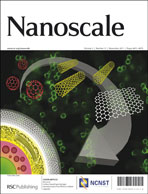Carbon-tuned bonding method significantly enhanced the hydrogen storage of BN–Li complexes
Abstract
Through first-principles calculations, we found doping carbon atoms onto BN monolayers (BNC) could significantly strengthen the Li bond on this material. Unlike the weak bond strength between Li atoms and the pristine BN layer, it is observed that Li atoms are strongly hybridized and donate their electrons to the doped substrate, which is responsible for the enhanced binding energy. Li adsorbed on the BNC layer can serve as a high-capacity hydrogen storage medium, without forming clusters, which can be recycled at room temperature. Eight polarized H2 molecules are attached to two Li atoms with an optimal binding energy of 0.16–0.28 eV/H2, which results from the electrostatic interaction of the polarized charge of hydrogen molecules with the electric field induced by positive Li atoms. This practical carbon-tuned BN–Li complex can work as a very high-capacity hydrogen storage medium with a gravimetric density of hydrogen of 12.2 wt%, which is much higher than the gravimetric goal of 5.5 wt % hydrogen set by the U.S. Department of Energy for 2015.


 Please wait while we load your content...
Please wait while we load your content...